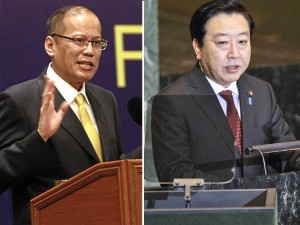Aquino upbeat over meeting with Japan PM

President Benigno Aquino III and Japanese Prime Minister Yoshihiko Noda. PHILIPPINE DAILY INQUIRER/AP FILE PHOTO
TOKYO—President Benigno Aquino III arrived here Sunday “excited” over his one-on-one meeting with Japanese Prime Minister Yoshihiko Noda.
The meeting on Tuesday will allow the two leaders, both relatively new in their jobs, to tackle a variety of issues covering what Ambassador to Japan Manuel Lopez called the “very special relationship” between Manila and Tokyo.
Of these, two things are expected to stand out: the territorial dispute in the West Philippine Sea and a review of the controversial Japan-Philippines Economic Partnership Agreement (JPEPA).
Accompanied by a 63-strong delegation, Mr. Aquino arrived at the Haneda Airport on board Philippine Airlines flight PR 001 at around 2:30 p.m. First in his agenda was a meeting with the Filipino community at the Japan Education Center later in the afternoon.
In his departure speech, he described his fourth foreign trip in two months as “proof of the growing confidence of other countries in the Philippines.” He previously visited China and the United States, and was in Tokyo for a secret meeting with Murad Ebrahim, chairman of the secessionist Moro Islamic Liberation Front.
“These are the goals of our visit—to let the light of change our country is enjoying now shine forth in the world, to introduce a Philippines on the straight path of governance, a Philippines that is open and with a level playing field for business,” the President said in Filipino.
In more concrete terms, Mr. Aquino and Noda are expected to exchange views and lift off from preliminary discussions their respective diplomats had begun on how to peacefully resolve the conflict in the West Philippine Sea.
“One of the more important items that they will talk about is the West Philippine Sea and we are seeking support with regard to the West Philippine Sea since Japan is also very concerned about it as the freedom of navigation may affect also the Japanese vessels plying (the area),” Lopez said.
Last week, Japan’s Ambassador to the Philippines Toshinao Urabe said his country preferred that the dispute be resolved “under the international framework” considering that “a lot of traffic goes through that area.”
The West Philippine Sea is apparently the main corridor for the shipment of 88 percent of oil imported by Japan from the Middle East, according to the Japanese Embassy in Manila.
One important item in the Aquino-Noda bilateral meeting would be the upcoming review of the three-year JPEPA. The agreement had been criticized over fears that it would pave the way for the dumping of Japan’s toxic wastes in the Philippines.
Another concern was the supposed unfair treatment of Filipino nurses, who had to first work as “candidate nurses” until they passed a licensure examination given in the Japanese language Niponggo.
In the meantime, they were doing the same job expected of regular nurses, a condition that could lead to “exploitation,” according to one lawmaker.
Lopez said the scheduled review of the JPEPA later this year would “pave the way for more of our nurses and caregivers coming to Japan.” He said the Philippine would also propose the inclusion of Filipino English teachers in the recruitment.
Mr. Aquino’s schedule will be particularly full on Tuesday when he sits down with a number business leaders prior to the bilateral meeting with Noda at the Kantei, the Prime Minister’s official residence.
His trip’s success will be measured heavily in the amount and quality of Japanese investment he would bring home. Trade officials earlier estimated the investment package from Japan at $1.1 billion.
“I am scheduled to meet with the honorable Prime Minister of Japan Yoshihiko Noda to discuss the relationship of our two countries and outline the direction we would both work on toward the development of our respective societies,” the President said.
“I am excited about the upcoming discussion, the exchange of ideas, and we are hoping that this would lead to the signing of agreements.”
The President would get his wish, considering the powerhouse cast of top Japanese corporations lined up to meet him at the Imperial Hotel where he would be staying—Toyota Motor Corp., Terumo Corp., Marubeni Corp., Tokyo-Mitsubishi, to name a few.
Lopez said the fresh investments would include the construction of a five-star Grand Hyatt Hotel in The Fort in Taguig City, and the hiring of Filipino workers to work on the “prefabricated homes” in disaster-hit areas in Japan.